
Wandering Sword Review
When you first catch a glimpse of Wandering Sword, it's very easy to casually dismiss the game as just some knockoff HD-2D wannabe RPG from some developer you've never heard of before. The game looks like Octopath Traveler in its pixel art style, and the combat resembles Live A Live with its battle grid. Those are good enough inspirations to have, certainly, but we've all experienced underwhelming copycats that can't come close to the influences they are mimicking. What are the chances this is just another poor imitation?
But sometimes, the more easily discernible comparisons are more superficial than substantial. After hearing some high praise for Wandering Sword after its release last year, I figured that there might be something compelling here after all. As it turns out, Wandering Sword is no copycat. It's one of the most unique RPGs I've ever played.
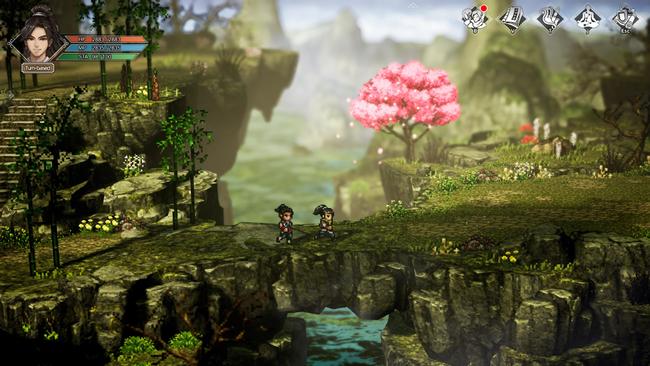
Inspired by Chinese Wuxia martial arts stories, this RPG places you in the shoes of Yuwen Yi, a young martial artist who ultimately finds himself in the center of a massive nationwide struggle involving varying sects and cults of Jianghu. I'm personally not very familiar with the Wuxia genre of Chinese fiction, so Wandering Sword more-or-less ended up being my introduction to this style.
After an opening sequence that sees Yi's traveling companions murdered in front of his eyes, he finds refuge in a small village. When his newfound home is attacked by mysterious invaders yet again, he sets off into a conflict bigger than he could have ever anticipated.
This leads me to the first cool component of Wandering Sword: the game's open-ended structure. After leaving your starting village for the first time, you don't have many leads. You also don't have a traveling party at this point, only a single companion. So, where do you go? Where can you find more allies? How can you possibly get strong enough to stand up to the adversaries that killed your friends & family? Well, just pick a direction and explore!
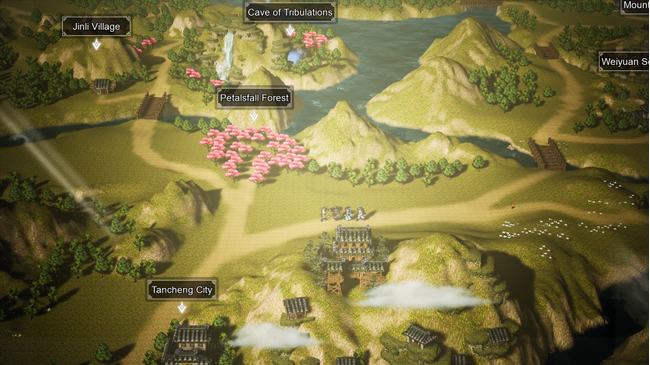
In addition to its more evident Octopath Traveler and Live A Live similarities, another game that came to mind as I played through Wandering Sword was Romancing SaGa 3. Romancing SaGa 3 (as well as many other SaGa series games) also exhibits a similar sort of open-ended world structure. In Wandering Sword, while there is a set main quest path, and the game will clue you in on where you need to go to progress the story, you can basically go anywhere right at the onset of the game. I've previously written about how the best SaGa games are driven by the player's sense of wanderlust, and Wandering Sword gave me that same feeling.
As you explore Jianghu, you'll find a lot of things. New towns, new equipment, deadly forests, dangerous mountainsides, and people ... lots and lots of people. There are numerous characters you'll meet in Wandering Sword, friend and foe alike. You'll also run into various separate narratives as you speak with those you meet and learn about the places they live in. Different towns each have their own conflicts, and much of the game's narrative content can be found in these spontaneous events you stumble across as you explore.
Wandering Sword has a quest system, there are a ton of quests. Most of these are more basic and of the fetch variety, offering simple but useful rewards. However, a good handful of the quests also manifest as substantial side stories to the game's main narrative. In fact, several of these side stories are what lead to recruitable characters to join your traveling party. Depending on where you go and who you talk to, there are several different potential allies to befriend. There's the swordswoman Shangguan Hong looking to learn Baidi Whirling Swordplay, or the rogue Bai Jin who takes on bandits and the Beggar's Sect to get what he wants. There are more than a dozen potential characters that can join you, each with sizable storylines regarding their motives and objectives.
Many quests also have numerous routes to complete them, which can lead to dramatically different narrative conclusions. Even life or death fates can be determined based on how Yi approaches the various interlocking quests in the game. It's a robust quest structure that many RPGs only wished they could have, even if some quests can be a little tricky at times to realize what you need to do to progress them.
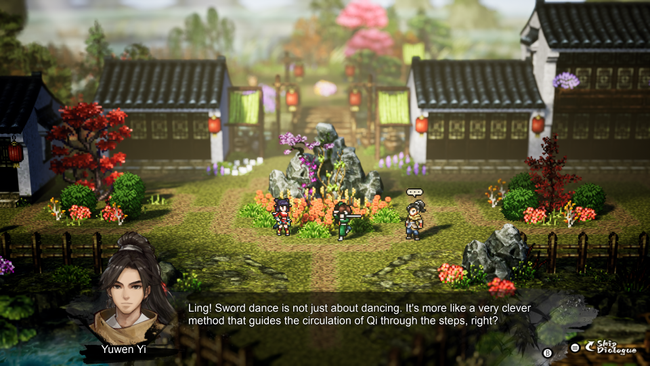
But I haven't even gotten to what truly sets this game apart yet. Wandering Sword's most unique mechanics — and honestly the coolest part about the game —revolve around how Yuwen Yi and his allies gain stats and skills. Like any good RPG, you'll gain abilities and power up throughout the adventure, but the way Wandering Sword approaches this is far from typical.
To get into all of the specifics of how the skill progression systems work in Wandering Sword would be a bit longwinded to share in detail in this review, but it essentially boils down to this. You gain both stats and abilities by finding other martial artists in the world and learning from them. At first, you'll be able to learn some basic abilities from novice fighters or the occasional wanderer. But in order to reach the heights of martial prowess, you'll eventually have to learn from the strongest martial artists you can find. Sometimes you'll be taught new techniques after completing quests, but the strongest abilities require you to beat its master in one-on-one combat, so your current abilities in place already have to be good enough to learn the strongest skills in the game.
The skills you learn in this manner come in the form of both active skills you can use in battle, as well as passive skills that raise your stat ceiling. So, in short, the more masters you can learn from, the stronger you can get. You can allocate the points you earn in this way into various "Meridians" that power up your characters. You can choose to raise whichever stats are most important to you, stats you are already familiar with, like HP, Strength, Defense, and the like. There's a bit more to it that would be getting a bit too much into the weeds, but again, the more martial artists you can meet, the more you can learn, the higher stats you can achieve, and the stronger you become.
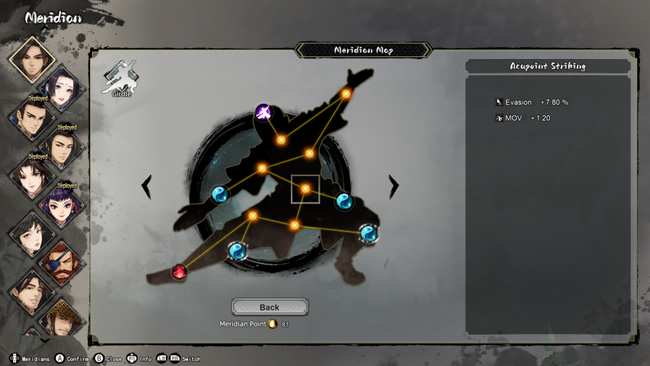
This all just feels so appropriate for this style of game, right? You can't become a master martial artist by simply grinding against rats in the sewer. You have to learn from a master, or from many masters. In addition to character quests, seeking out powerful fighters practically becomes the primary reason to explore in the first place. I searched high and low for as many skilled martial artists as I could find, to see if they had any abilities I could learn from them. Is this what it means to be the protagonist of a Wuxia story?
To be clear, fighting normal enemies is still an important component of progressing your characters, as it is in most RPGs. For each enemy you defeat, your party will gain Martial Points that can be used to power up both stats and skills, but only to a certain limit. Only by learning skills from other characters can you actually raise your overall skill potential to take on the strongest enemies in the game. It's unlike any other RPG I've played.
With all that said, I still haven't actually described what combat is actually like in Wandering Sword. As aforementioned, it's most easily compared to Live A Live, in that your party is placed on a grid with a similar battle perspective. Abilities work on a cooldown system, where the strongest attacks take the most turns to recharge before they can be used again. It's an exceptionally competent combat system that works well in conjunction with the cool skill & progression already discussed.
One small wrinkle here is that combat can be either turn-based or real-time, depending on a toggle set by the player. This is useful in ways these sorts of systems usually are. Sometimes for the more difficult battles in the game, going slowly turn by turn is best so you can plan out your movements and abilities carefully. But, for taking out trash mobs that you can easily clear, real-time will have battles over in a snap. Once again, it's well done.
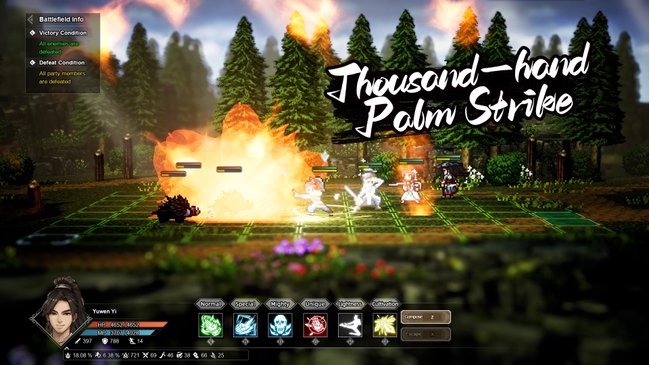
The are even more mechanics baked into the game that would take too long to describe in full detail, like the affinity or crafting systems, or gifts and dueling. All in all, Wandering Sword is surprisingly dense and surprisingly cohesive throughout.
Where Wandering Sword struggles most isn't in its mechanical systems design, it's more in the game's polish and execution. The game's user interface is honestly pretty ugly in places, with a bold sans-serif font filling simple text boxes throughout the game. In his preview about a year ago, Josh said the UI and menu designs felt incomplete, but those still haven't changed much for the final release. Both menu and battle controls are also pretty awkward, especially with a controller, although this is alleviated somewhat when played with a mouse cursor. Wandering Sword can be an especially clunky-feeling game, at times, and it takes some getting used to.
Luckily, since its release half a year ago, Wandering Sword has already been updated several times, with more updates planned for the future, so hopefully these sorts of issues can be ironed out with time.
The game's dialogue and localization are hit or miss, too. I've experienced worse English translations in the past, but Wandering Sword's dialogue can be rough, with awkward phrasing or stale-sounding lines. Even if the localization was improved, there are several moments in the game where dialogue could have probably used an editing pass regardless. Oftentimes characters will ramble at length in a circuitous fashion, which can leave some scenes dragging out for longer than necessary.
While the story itself can be entertaining, it's also full of commonly seen tropes that you've probably seen in games or TV many times before (I expect these to be even more evident to anyone more familiar with Wuxia than me). Although it has its serious moments, I also thought Wandering Sword was excessively cheesy at times, although I feel like that might be just how Wuxia is. It's more popcorn entertainment than anything meaningful, moving, or thought-provoking.
Despite the game's struggles in localization, polish, and elsewhere, I decidedly enjoyed playing through Wandering Sword. The skill and progression systems are unique & captivating, the visual style is excellent, and it's an exceptionally cohesive game all around. If The Swordman Studio can polish up some of the lingering issues, this could be a real gem of an RPG.